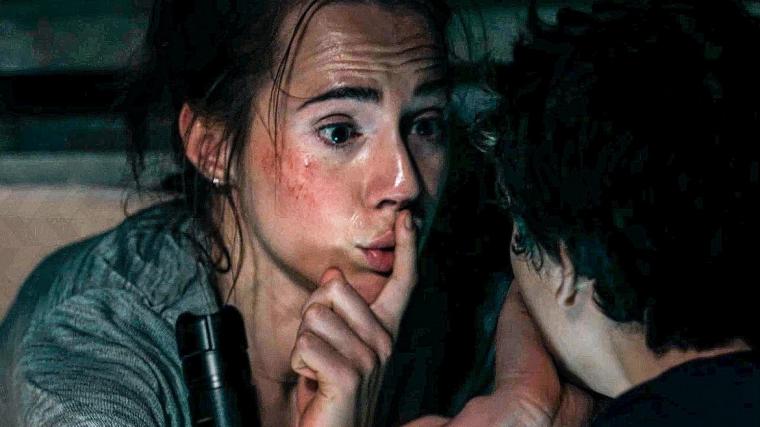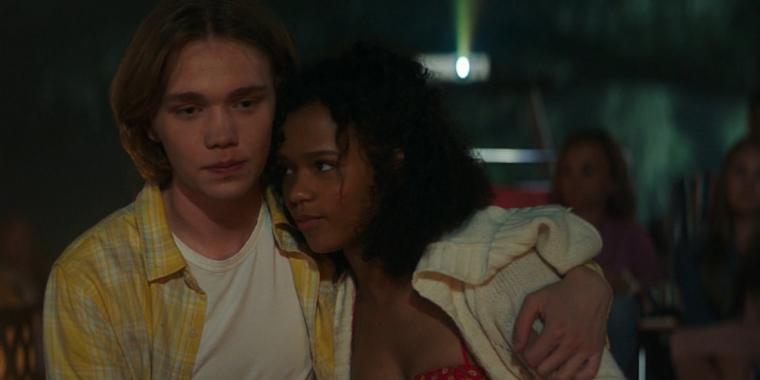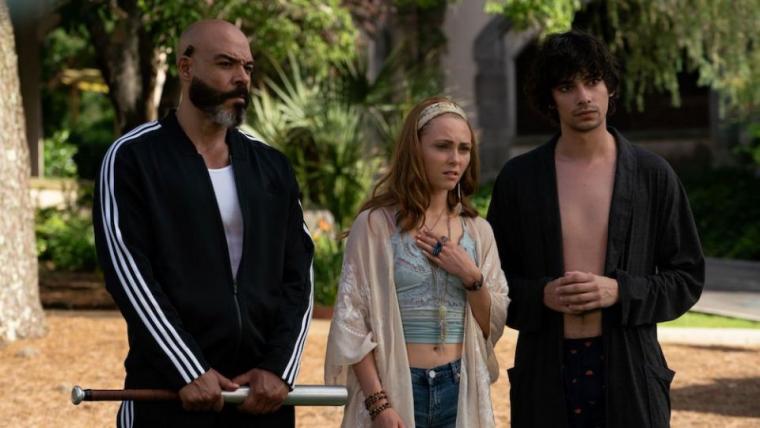
Russell Crowe in Unhinged
UNHINGED and WORDS ON BATHROOM WALLS
Did you hear? The Quad Cities' two cineplexes – Davenport 53rd 18 + IMAX and Regal Moline Stadium 14 – are again open for business … and screening actual new releases, to boot! Speaking as a movie lover who was accustomed to visiting one or both at least weekly for longer than he cares to recall, and knowing full well that governors' orders could again shutter the theaters at a moment's notice, this is almost unfathomably great news. So great, in truth, that even though I didn't really care for either offering during my first double-feature since March, I wouldn't have traded the collective three-and-a-half hours of Unhinged and Words on Bathroom Walls for anything. Except, maybe, for better scripts.
Before getting to the films themselves, though, a note about my overall experience at the Davenport venue this past Friday: It felt just like old times, albeit with more health and safety regulations in place, which is about the highest praise I could offer. (Even purchasing my tickets online was reassuring, given that after you reserve your seats, the seats to your left and right are instantly blocked off, as well, ensuring proper distancing between patrons.) The cineplex's main entrance is the only one currently open, and once you get past the panes of plexiglass leading to the lobby, everything is right where you remember it being, though the employees are certainly sporting more masks and gloves than they were back in March. I'm not a concessions guy, so I can't attest to any unfamiliar procedures or regulations at the refreshment counter, and as I started my double-feature mid-afternoon, there weren't enough people around for me to judge how well or poorly guests adhered to the carpets' social-distancing reminders. But the lobby and hallways and restroom and auditoriums I visited appeared thoroughly cleansed, and after the previews end, there's even a new “Don't forget the snacks!” PSA explaining Cinemark's enhanced commitment to sanitizing, with everyone on-screen masked except when they were munching on their popcorn or sipping their sodas. So I felt totally secure in the theater's cleanliness. And then the Russell Crowe thriller Unhinged went and made me feel all dirty.
Some of you may have fond memories of Steven Spielberg's 1971 TV movie Duel, the director's pre-Jaws thriller in which the unseen driver of a tanker truck terrorizes Dennis Weaver on the highway for 70 spectacularly intense minutes. Unhinged is like Duel with Crowe cast as the truck. (This isn't a comment on the actor's startling, morbidly obese frame, but it definitely could be.) Following director Derrick Borte's upsetting opening montage – documentary footage underlining America's rage issues as a whole and road-rage issues in particular – we're introduced to Crowe's character, a huffing, puffing psychopath who, despite being referenced as “Tom Cooper,” is billed in the end credits merely as The Man. (Even this feels like a nod to Duel, where Weaver's victimized salesman was named David Mann.) His first scene finds The Man pulling into what we learn is his ex-wife's driveway, and after busting down her door and murdering his ex and her new lover with an ax, he drenches the place in gasoline and drives away as his former home bursts into flames. Then, amazingly enough, our Man starts to get really angry.

The cause of his reignited ire is Rachel Hunter (Caren Pistorius), the single mother of a 15-year-old son (Gabriel Bateman), who makes the tragic mistake of honking at The Man's vehicle just a li-i-ittle too aggressively as it sits idle at a green light. From that point on, The Man is out for blood, chasing Rachel's beater car through Los Angeles streets and, after conveniently snagging the woman's cell phone at a gas station, starting his own friends-and-family plan with Rachel's loved ones on the lunatic's hit list. There really isn't more to Unhinged than that, and if the film were as propulsive and technically virtuosic as Duel, it might have been a low-rent classic. Sadly, though, it isn't. There's so much clunky foreshadowing in the early scenes with Rachel – her son's winning video-game strategy for Fortnite, her mom's subdivision described as “a maze of spaghetti” – that there's no enjoyment in watching screenwriter Carl Ellsworth's contrivances eventually click into place. The violence, which includes two absolutely horrific instances of cars running people over, is so stunningly ugly that it negates any trashy fun you could conceivably get from the movie's single-minded purpose.
And then there's the Russell Crowe problem – which, oddly, also proves to be Unhinged's only true saving grace. Crowe appears to still be carrying the bulk, even the prosthetic bulk, he employed for his role as Roger Ailes in Showtime's 2019 miniseries The Loudest Voice, and it's a distracting sight. Not for a moment do you believe it when this 300-pound Man manages to get away from a pair of cops on foot, and his guttural wheezing while driving is so labored and painful-sounding that you're nearly pulled out of the movie, less worried for Rachel's safety than concerned that Crowe might have a real-life on-screen heart attack. But even though his character is barely defined and his Southern accent (one seemingly borrowed from De Niro's Max Cady in Cape Fear) comes and goes, Crowe is riveting.
None of the performers are bad, and the empathetic Pistorius, who's like Shailene Woodley with more natural gravitas, is awfully good. Crowe, however, approaches nearly operatic terrain with his sweaty sociopath. As written, The Man is merely a conceit – a symbol of all of our country's bilious, impotent hate in one triple-XL package. Yet while the figure is vaguely laughable, there's no laughing at Crowe's Man, whose suicidal madness is unmistakable whether he's making casual threats or driving a butter knife into a diner patron's neck; like Faye Dunaway in Mommie Dearest, Crowe dives so deeply into interior and exterior fury that he wholly transcends camp. While this doesn't make the performer “entertaining,” per se, you can't take your eyes off him, and as much as I occasionally wanted to, I couldn't take my eyes off Unhinged, either. I suppose you could chalk that up to it being the first movie I've seen on the big screen since (ironically) Friday the 13th of March, when I saw the pro-faith musical drama I Still Believe. But I'm gonna give Crowe the lion's share of credit. I'm a little worried about what might happen if I don't.

A complete palate cleanser for the lingering effects of Unhinged, director Thor Freudenthal's romantic drama Words on Bathroom Walls completed my double-feature, and it was just square and drippy and sincere enough to make me miss all the blithe YA tragicomedies I've no doubt been deprived of over the last five months. If you've seen Love, Simon or Everything, Everything or other works of their kind, you'll recognize the hook instantly, opening as the film does on a funny, friendly high schooler (Charlie Plummer's Adam Petrazelli) who's Just Like You Except. Instead of “... except I'm gay” or “... except I have a life-threatening disease,” however, what sets Adam apart from his peers is “...except I'm schizophrenic.” And the movie, which screenwriter Nick Naveda adapted from Julia Walton's novel, follows the young man in his senior year as he attempts and discards different medications and falls for a pretty brainiac (Taylor Russell's Maya) as isolated, in her way, as he is.
This is one of those prototypical teen-angst sagas – Five Feet Apart and Midnight Sun and Me & Earl & the Dying Girl are others – that's invariably praised for its sensitivity in the presentation of youths battling debilitating illness, and you can't argue that the WoBW filmmakers' hearts aren't in the right place. I just wish that was a less clichéd place. Barring Adam in his quest to be a gourmet chef – cooking is the one activity that briefly silences the voices in his head – every character here is designed according to strict high-school-flick stereotype, and the lead's relapse-and-recovery arc is recognizable from way too many titles in this genre; you can safely make plans for a restroom visit (wash your hands!) depending on which too-familiar scene you sense coming around the corner.
And yes, the movie does treat Adam's battles with schizophrenia (which Plummer enacts with marvelous tact) with a measure of dignity. That dignity is almost completely eradicated, though, by the figurative cartoons who routinely pop up as embodiments of his mental illness that only Adam can see: AnnaSophia Robb as the free-spirited hippie Rebecca, Lobo Sebastian as the baseball-bat-wielding Bodyguard, and Devon Bostick as the shirtless stud Joaquin whom Adam describes as “the best friend in every romantic comedy in the '90s.” Every time these figments appear, and they appear a lot, the film's realism is jettisoned in favor of achingly twee rom-com convention (not for nothing is Drew Barrymore's Never Been Kissed the movie's much-referenced touchstone), and regarding Bostick, I'd argue that any movie's stabs at seriousness are immediately undermined by the casting of the goofus older brother from the Diary of a Wimpy Kids.

Yet Words on Bathroom Walls still kind of works – although, again, perhaps only because I'm currently desperate to see anything work on the big screen. Though Russell is stuck with an initially horrible role (Adam unconvincingly falls for Maya when she's being both a bully and a priss), the performer herself is lovely and somewhat touching – though not nearly as much as she was in last year's Waves – and there are excellent supporting turns by Molly Parker as Adam's understandably concerned mom and Walton Goggins as Mom's enigmatic beau. (Goggins' character arc is the film's most refreshing surprise.) Schizophrenia's accompanying physical toll is presented, and shot by cinematographer Michael Goi, with understated urgency, and is far more representative of Adam's struggles than those damned imaginary friends.
The best reason to see the movie, however, is Plummer. Adam always seems to be just one heartbeat away from either a major laughing fit or crying jag, and the young actor is dazzlingly authentic, as well as sympathetic without ever begging for our sympathy. Plummer comes off as a less-threatening Paul Dano here, but he has a similar aura of unpredictability; you like Adam enormously, yet understand that everything you like about him, due to his condition, can also vanish without warning. It's a first-rate performance, and underwhelming though Words on Bathroom Walls winds up being, Plummer, like Russell Crowe, supplies proper motivation for a cineplex visit while we wait for Hollywood's new releases to get better. They will, though. I still believe.








